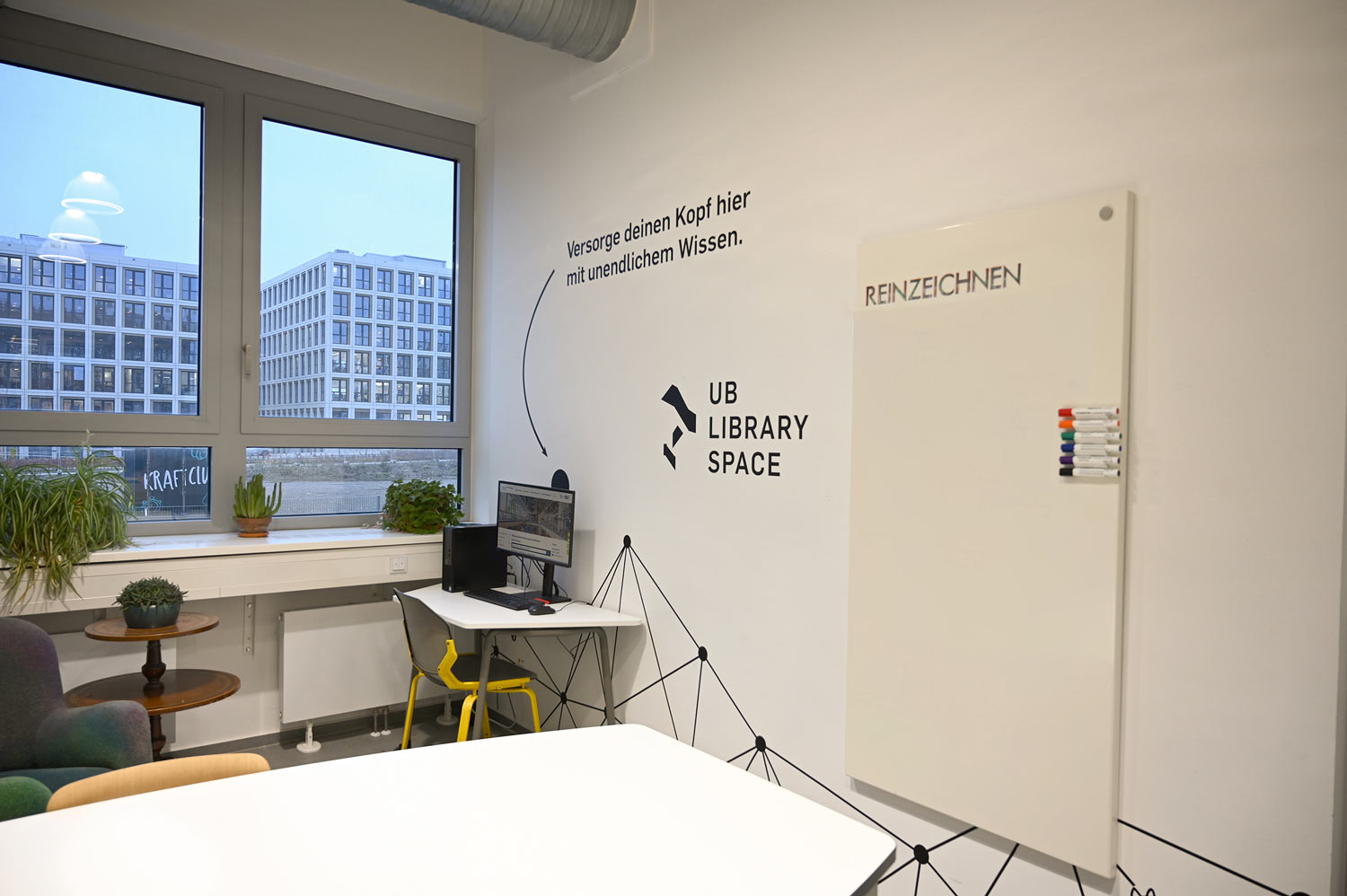Annual report Bochum University Library 2024
1. Introduction
The University Library (UB) Bochum looks back on an eventful year in 2024, during which it further expanded its role as a central information and service facility for research, teaching, and study at Ruhr University Bochum (RUB) and implemented numerous innovative projects.
I would like to highlight two particular successes:
As a result of intensive work in 2023, the completely redesigned library portal was launched in March 2024, and the UB received a lot of positive feedback for its newly designed and largely barrier-free website. In addition, a successful application in the second DFG funding phase “Open Access Publication Costs” (2025-2027) resulted in €1.2 million being raised to support open access publishing at RUB.
In research data management (RDM), great progress was made thanks to new positions at the University Library and intensive cooperation with IT. SERVICES in the Research Data Services (RDS) team. The RDS team made an important contribution to the development of an RDM curriculum for the UAR partner universities with RUB's own training courses and supported over 230 researchers in 2024 with numerous courses on topics such as data publication, open data, and data management plans. The team's participation in the DH.NRW state FDM concept also underscores its strength in cooperation.
A key event for the University Library's Digital Humanities Center was the opening of the “DH Space”, a new venue for exchange and networking in the field of digital humanities (DH). Workshops, poster sessions, and informal meetings of the DH community take place here, giving the University Library's commitment to digital humanities a physical presence.
In the area of open access, a successful DFG application secured continued publication support until 2027. New open access transformation agreements and a newly established monograph fund expanded publication opportunities. New Diamond Open Access series were established via the OMP RUB platform.
In 2024, the Bochum University Library continued to support the strategic goals of Ruhr University in the areas of sustainability, diversity, and inclusion.
The library was involved in numerous events and dialogues with the “UB Barrierefrei” (Barrier-Free Library) working group, for example on Diversity Day. The accessibility of the RUB Bib app and the library infrastructure was further improved. An internal UB guide to sustainability was developed and the greening of the library was expanded with “vertical gardens.”
The Digital Library department made significant progress in digitization, for example by expanding the RUB-Bib app to include a booking option for university library courses and by providing a new CMS for the university library's new website. The university bibliography database was improved by importing data from external sources, and a new pre-registration form for external customers was developed.
The UB also lived up to its role as one of the most important places to stay and study on campus in 2024: New lounge furniture on levels 0 and 1, the creation of a design thinking area in the “DH Space,” and a newly furnished dining area and soundproof think tanks improved the quality of the UB building as a place to hang out and study.
As a contribution to the RUB's transfer strategy, a new “UB Library Space” was opened in the Makerspace at MARK 51°7, giving entrepreneurs access to the UB's digital information resources.
The UB Bochum's range of courses on dealing with digital information was usefully supplemented by the growing range of advisory services in the publication and research-related services.
With seven exhibitions, eight lectures, and a reading, the University Library was once again a central location for knowledge transfer and social dialogue in 2024.
We look back with great joy on the numerous small and large successes of the University Library Bochum in 2024. They were the result of a great team effort, for which I would like to express my sincere thanks to my team.
Jörg Albrecht, Director of the University Library Bochum

© RUB, Rosenkranz
2.1 For excellent research
2.1.1 Digital Humanities: Tools and Collaborations
On April 19, 2024, the DH Space was officially opened at the Bochum University Library – a new place for networking and exchange for all those interested in DH on the RUB campus. The grand opening was attended by the director of the Bochum University Library, Dr. Jörg Albrecht, and Sonja Rosenberger, head of the Digital Humanities Center (DHC) at RUB. Since then, the space has been available for workshops, poster sessions, and informal exchanges.
The collaborative project “Tief in die Karten geschaut” (Looking Deep into the Maps) between the Bochum University Library and the Martin Opitz Library in Herne was honored with the TIP Award (Team Award Information Professionals) at BiblioCon in Hamburg. The joint map portal increases the visibility and scientific use of the map collections of both libraries. Integrated features include applications for visualization, network analysis, full-text recognition, and a feasibility study on long-term archiving.
From September 30, 2024, to October 1, 2024, the DHC, together with the RUB's Digital Humanities Network (NDH), hosted DH Day #6 on the topic of “Collaboration and Networking in the DH.”
With the support of five new team members, the DHC further expanded its consulting services and accompanied numerous projects. In addition, new cooperation agreements were concluded. The DHC website was integrated into the overview of research-related services on the new UB website.
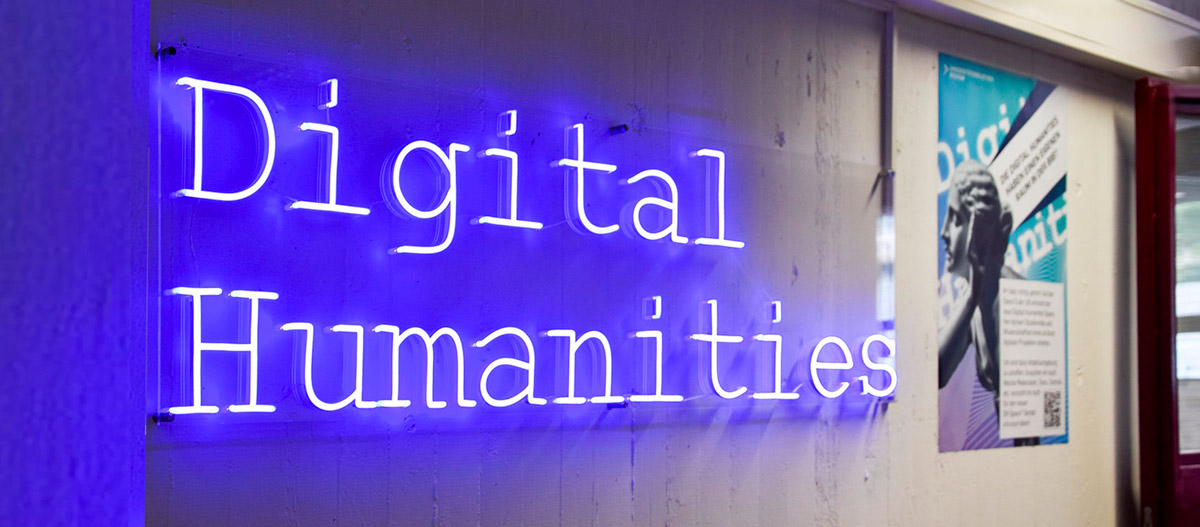
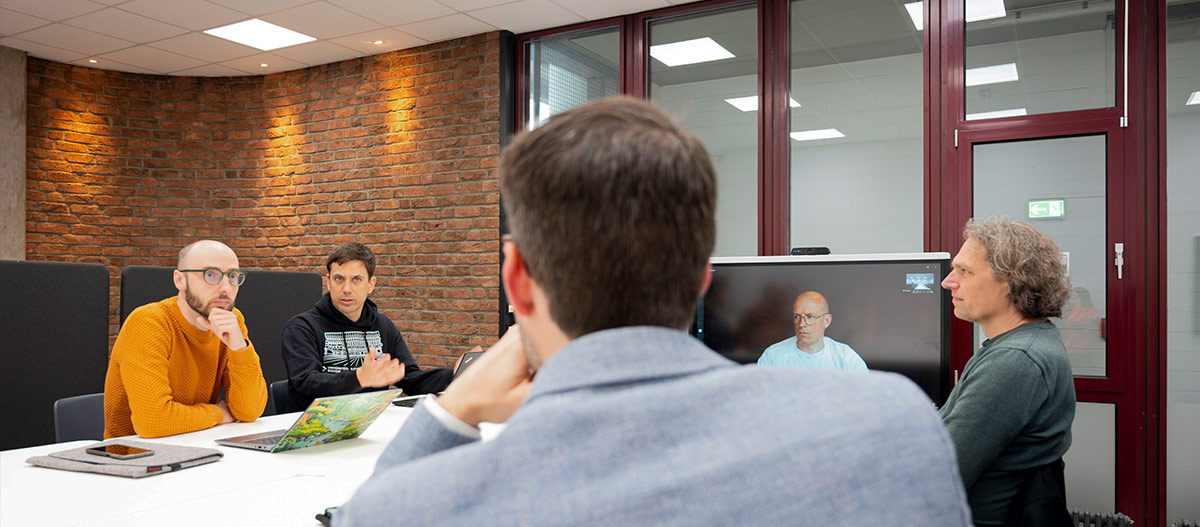

© RUB, Rosenkranz
2.1.2 Forschungsdatenmanagement (FDM)
In 2024, the Research Data Services (RDS) team, which brings together staff from the Bochum University Library and IT.SERVICES at RUB, made excellent progress in the area of research data management (RDM). As part of the plan to expand RDM services at RUB, three new positions were filled, two of them at the University Library. One of these positions is a data curator, who is primarily responsible for data curation and data publication, while the other is a data consultant, who focuses on supporting joint projects and establishing an RDM network at RUB. In addition, the existing position of research assistant for RDM at the University Library was successfully filled after being vacant for six months.
Cooperation within the University Alliance Ruhr (UAR) was further intensified. Thanks to an increase in staff, RUB was able to play a key role in shaping the FDM curriculum of the UAR partner universities and contribute its own training courses to a broad range of courses on offer. In addition, it was possible to supplement the offering with further short-format lectures, e.g., as part of Research Data Day or Open Science November at RUB. In 2024, the RDS team offered a total of 17 courses, both in person and online, and trained over 230 scientists, especially young scientists, in the basics of FDM, the RUB's research data repository “ReSeeD,” the topics of data publication and open data, as well as data management plans and the helpful RDMO software. In addition, lectures with external experts, e.g., from the National Research Data Infrastructure, were organized for RUB researchers on FDM topics.
The RDS team was able to respond to a wide range of inquiries through numerous consultations, covering topics such as the publication and storage of research data, legal aspects, data formats, application texts, metadata, data management plans, data organization, service offerings, and licenses. These consultations helped researchers organize their research data efficiently and sustainably and assisted them in submitting successful third-party funding applications.
Another milestone was the possibility of data publication with “ReSeeD.” In addition, work was done to make the state service “Coscine” available to RUB members.
At the state level, the RDS team participated in the development of the state concept FDM of the Digital University NRW (DH NRW), which was published in May 2024.
![]()
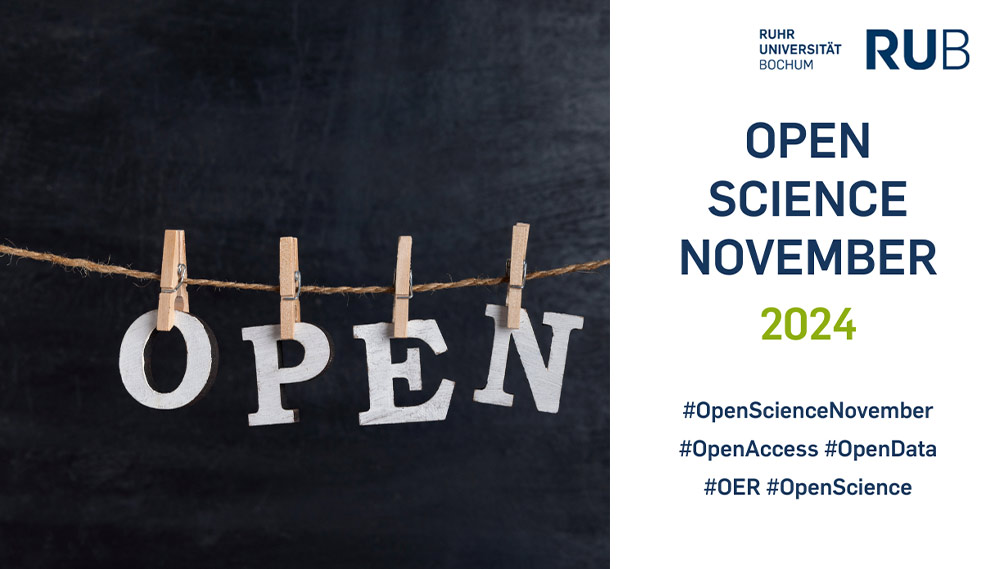
© RUB, Weituschat, Hundt I © Open Science November
2.2 For international visibility and reception
2.2.1 Bibliometrics
At the request of the university administration and the faculties, various institute, project, and personnel analyses were conducted or supported in 2024, for example in the context of perspective planning and application procedures. In addition, the affiliation details of the RUB were checked in the two databases Web of Science and Scopus. This resulted in the identification of 100 new name variants of the RUB and its organizational units, which were then assigned to the RUB. These name variants were forwarded to the operators of the two databases to ensure the visibility and correct assignment of RUB research work in international databases. In addition, scientists were supported in maintaining their personal profiles in Web of Science, Scopus, and Google Scholar.
Overall, the Bochum University Library was able to continue its successful contribution to the visibility and reuse of RUB publications in 2024 through this commitment.
2.2.2 University Bibliography
At the end of 2024, the RUB's University Bibliography listed over 230,000 publications, including over 14,500 from 2024, with over 5,000 records added automatically via ORCID profiles. The editorial team processed over 230 smaller data reports, most of which were received by email, as well as around 200 larger data reports, which often included complete literature lists. From these lists, the publication data still missing from the university bibliography was identified, thus further completing the representation of RUB-related publications.
In addition, 342 RUB researchers linked their ORCID profiles to the university bibliography, meaning that by the end of 2024, a total of 1,858 RUB researchers had synchronized their ORCID profiles with the University Bibliography.
The publication list service “PubliG” continues to run smoothly and is very self-explanatory, so only a few extensive consultations were necessary. Most of these were questions related to the creation of new publication lists. The continued popularity of this service contributes to improved, uniform, and digitally interoperable visibility of RUB publications on various university websites.
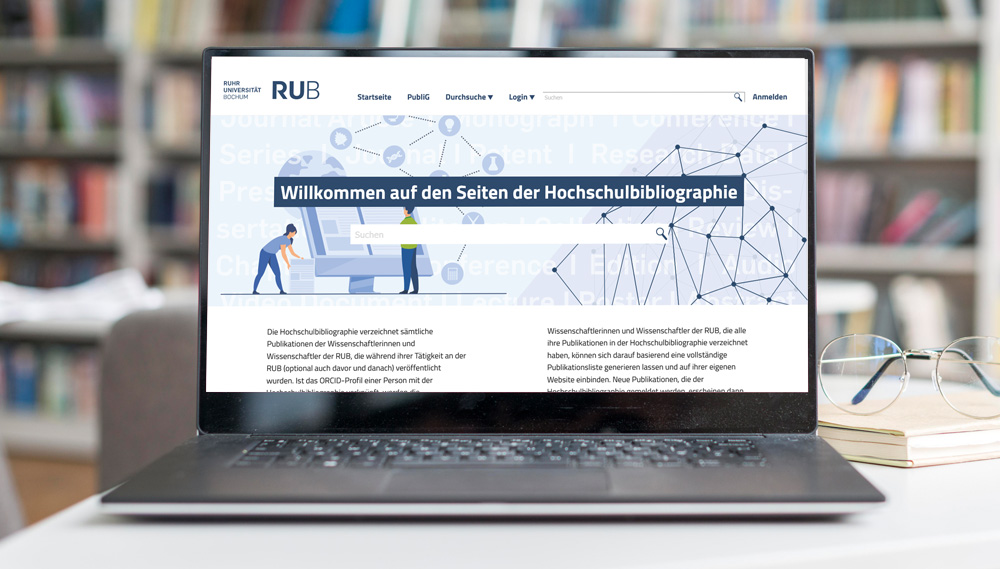

© RUB, Rosenkranz
2.2.3 Provision of e-journals and promotion of open access
With a significant increase in funded articles in 2024, the first funding phase of the DFG's Open Access Publication Costs funding program was successfully completed. At the same time, the continuation application submitted in 2024 was approved, meaning that DFG funding of €1.2 million will also be available for publication funding in the following years (2025-2027). Further free or discounted open access publication opportunities were created in 2024 through numerous open access transformation agreements coordinated by the University Library and jointly financed with the faculties. A new monograph fund was established, through which a total of eight books were funded in 2024.
The University Library continues to be involved in science-led open access publishing (Diamond Open Access). In 2024, two new open access series were launched via the OMP RUB publication platform hosted by the University Library. CLIMATE ENERGY ETHICS publishes works produced by the Climate, Energy, Ethics research group and in the field of applied ethics research at RUB. The Working Paper Series EMPATHIA3 addresses aspects of the interdisciplinary, BMBF-funded project EMpowering Police Officers and TeacHers in Arguing Against Antisemitism. Many other full texts by RUB authors were published in 2024 via the RUB document repository, including dissertations and other first and second publications.

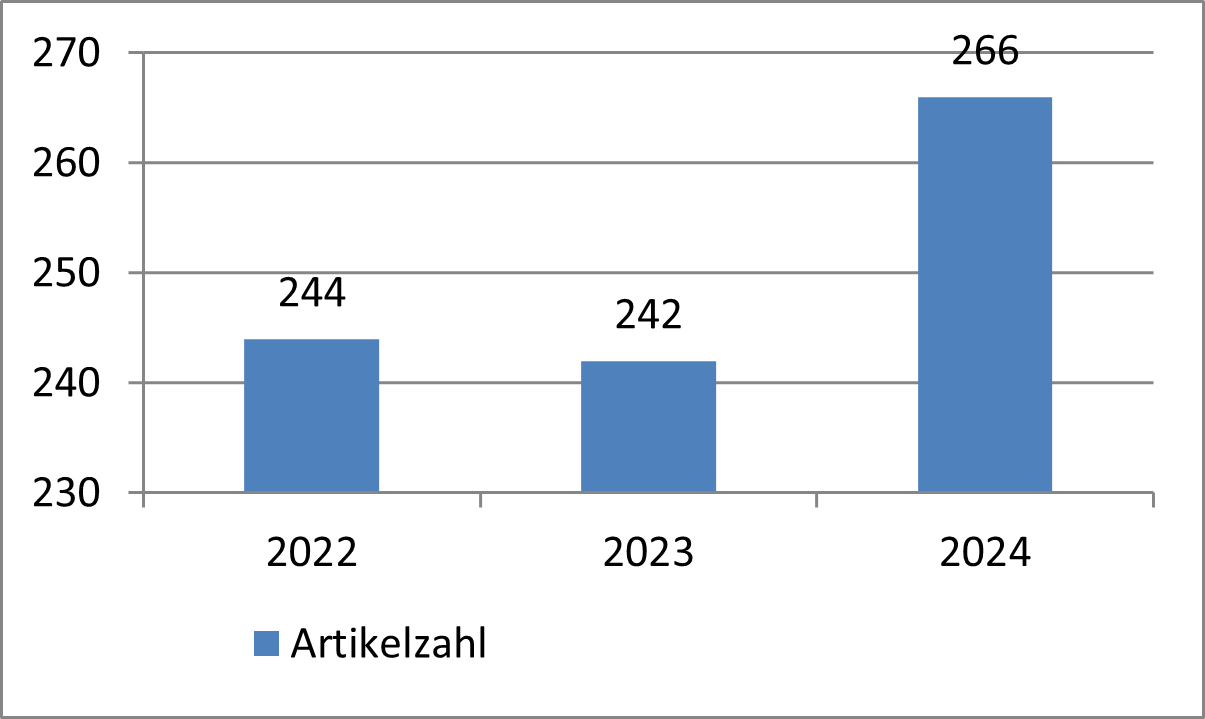
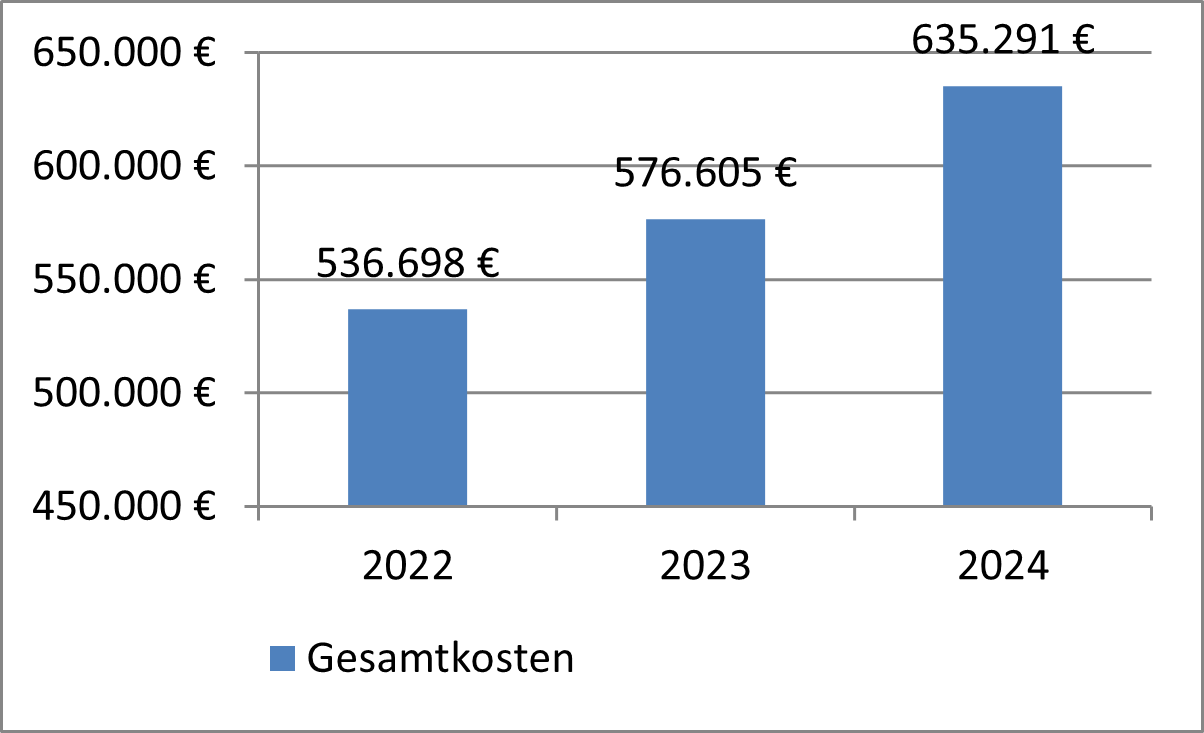
© RUB, Lucht-Roussel
2.3 Diversity, Inclusion and accessibility
In 2024, the University Library and its Accessibility Working Group once again participated in numerous events to highlight its commitment to diversity, inclusion, and accessibility and to invite event visitors to engage in dialogue. It had a booth at RUB's Diversity Day and also represented the University Library at the Walk of Diversity. Furthermore, the UB Bochum participated in the university-wide strategic dialogue on the topic by contributing to the RUB's Student LifeCycle Talk Inclusion.
In the context of the university library's new website, the AG UB Barrierefrei worked closely with the RUB's AStA and the Student Representative Council for Students with Disabilities. Also in close cooperation with the RUB Student Representative Council for Students with Disabilities, the accessibility aspects of the University Library's own RUB Bib App were further improved by the Digital Library of the University Library of Bochum. In addition, the long-established exchange with the RUB's Inclusive University team was continued.
The University Library's efforts to remove barriers within the building were taken up in 2024 with an expansion of signage. The partially wheelchair-accessible toilet on the first floor is now easier to find.
In 2025, there will be personnel changes within the AG UB Barrierefrei (Accessibility Working Group). However, its commitment to accessibility, inclusion, and diversity will continue unchanged.
2.4 Internationality
As a central operating unit of the RUB, the University Library reflects the university's self-image as a cosmopolitan and diverse place.
In the core area of library work—providing information for study, teaching, and research at RUB—the international perspective is of great importance: the subject guides at the UB Bochum design the electronic and printed collection taking into account the multilingual nature of the campus and its subjects.
We have a long-standing cooperation with the RUB's International Office, which we continued to maintain in 2024. English-language library tours and research and literature management training courses were also part of our course offering.
Through our membership in the IGELU and DACHELA associations, we supported the regular operation of the ALMA library management system with international, collegial exchange.
2.5 Sustainability
Both the internal commitment of the University Library and our cooperation in the area of sustainability were further expanded.
In order to provide all colleagues with suggestions for more resource-efficient working practices, we developed an internal guide. Further hanging gardens, which will cascade down from the top floor of the University Library, were planned. In cooperation with all teams in our institution, we determined for which purposes printed information materials will continue to be indispensable and thus significantly reduced paper consumption in these areas. In addition, we added further information to our sustainability page and exchanged ideas with other libraries at the training course “How green is that ?!”
On the RUB campus, we established contact with the sustainability working group of the RUB's Center for Foreign Language Education. We intensified our well-established exchange with the RUB's sustainability office and contributed to their newly established format of sustainability walks across the campus. We were also represented at the RUB's Sustainability Day and at the AStA's sustainability flea market.
Beyond the campus, our working group also participated in a clean-up campaign in Bochum's city park on World Clean Up Day 2024.
Last but not least, in December 2024, the “Applied Sustainability” degree program at Bochum University of Applied Sciences visited us to film a project on the topic of repair culture.
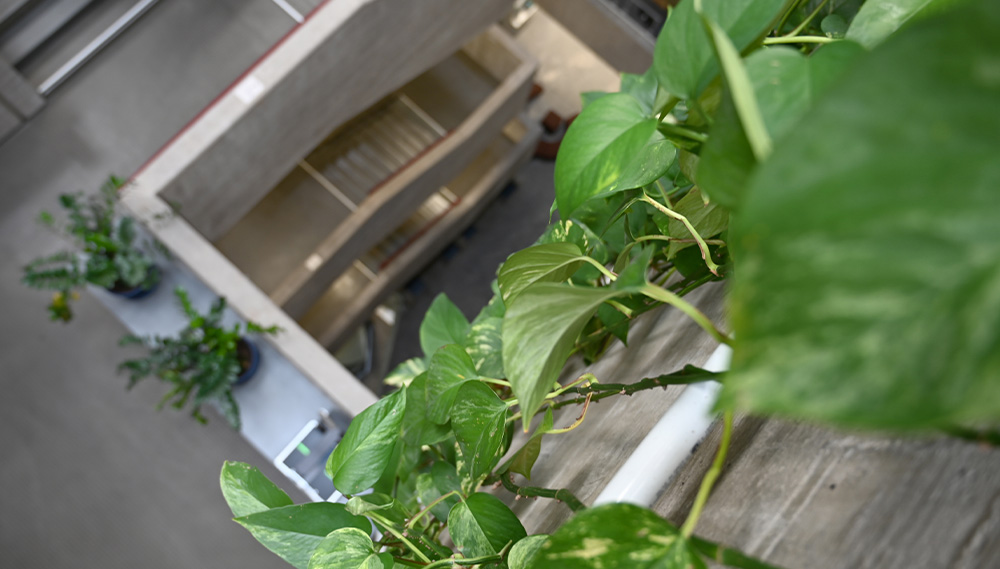
© RUB, Rosenkranz
3.1 The digital library
The Digital Library department made significant progress in various areas last year. One key project was the expansion of the RUB-Bib app to include course management, which enables students to organize their studies more efficiently. In addition, the infrastructure for the university library website was provided, which forms the basis for the library's new website, significantly improving user-friendliness and accessibility. In the university bibliography, the import of data from external sources (Web of Science, Scopus, Crossref, Datacite) was promoted in order to increase the quality of the database and thus also the quality of research and the available scientific resources. In addition, the internal communication and calendar management of the University Library Bochum was migrated to the RUB's Exchange infrastructure, which optimizes communication and collaboration with other organizational units within the Ruhr University.
The team was significantly strengthened by the hiring of a DevOps engineer, who played a key role in the introduction of a sophisticated monitoring and configuration management system for the IT infrastructure of the Bochum University Library. These measures have significantly improved the stability, maintainability, and security of the IT systems.
In the area of software development, the book recommendation system was reimplemented, further improving the user experience and efficiency of the library, and is scheduled to be made available to customers in 2025. In addition, we have further strengthened the Digital Humanities Center through our support and introduced a pre-registration form for external customers in the library system area to further improve service quality.
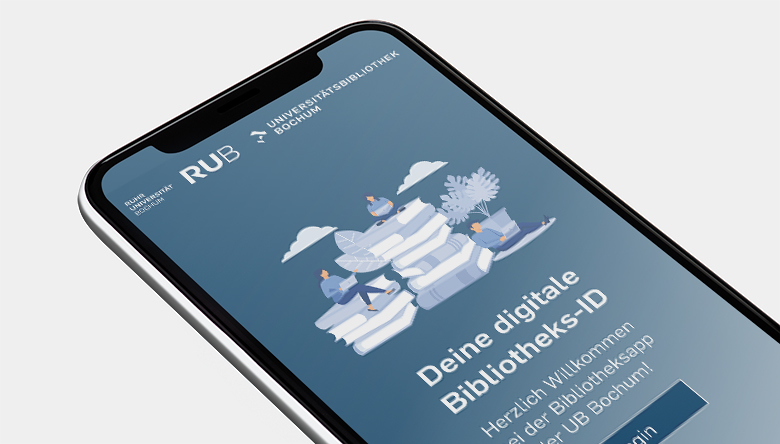
© RUB, Rosenkranz
4.1 The University Library as a place of staying and learning
In 2024, there were a number of projects and measures aimed at further improving the quality of the student experience and learning environment at the Bochum University Library and its departmental libraries.
One highlight was the addition of another university library location: in December, the new “UB Library Space” was completed and opened at MARK 51°7 in the RUB's Makerspace.
In the Library Space, non-university library users can access the University Library's electronic resources as walk-in users at the MARK 51°7 campus location by using a LoginID. The new Library Space in the RUB Makerspace provides entrepreneurs with digital information and, at the same time, supports them in their information research with remote consulting services via chat, telephone, or email provided by our specialist staff. The University Library is thus making an important contribution to the transfer concept of the Ruhr University Bochum.
© RUB, Rosenkranz
In the university library building, the reduction in the number of computer workstations has made it possible to create a new attractive lounge area in front of the DH Space, which will also open in 2024, making this space for digital humanities at RUB even more appealing. Inside the room, a new design thinking area was created and the usage concept was expanded with new technical equipment, such as laptops with DH software tools that can be borrowed and a smartboard.
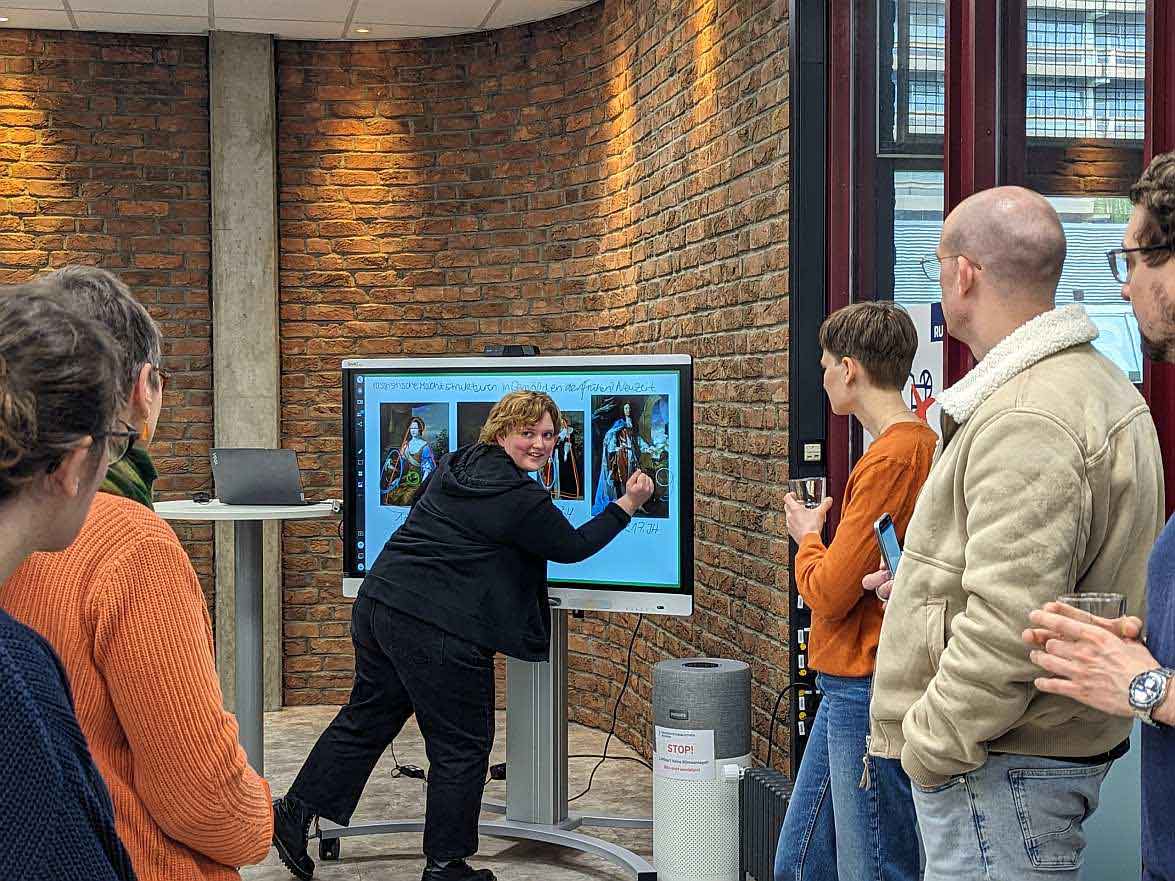
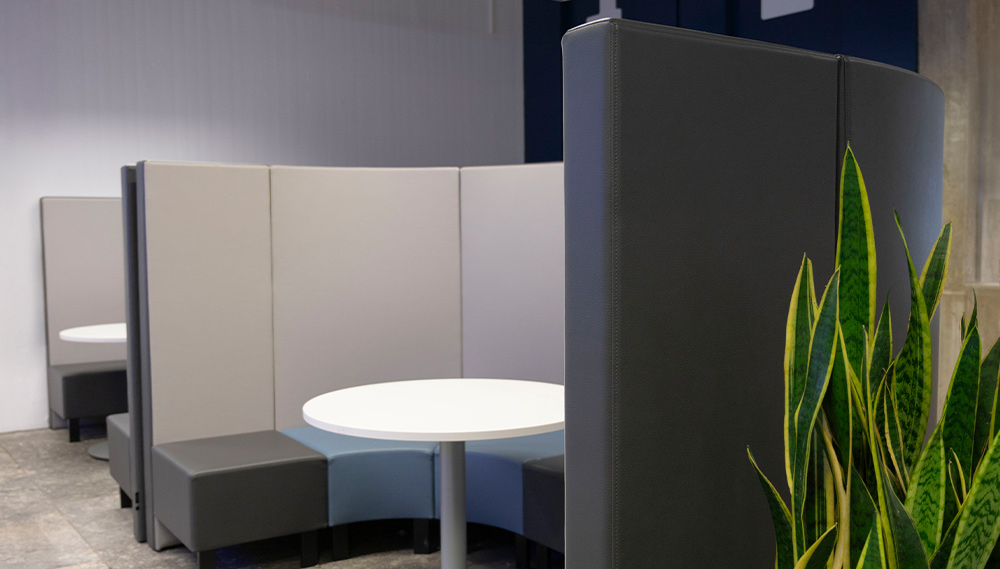
Next to the magazine reading area on level 0 of the University Library, a new area with four bistro tables has been created where eating and drinking are permitted. This means that the University Library now has a second dining area on level 0, which is to be expanded with an outdoor terrace in 2025.
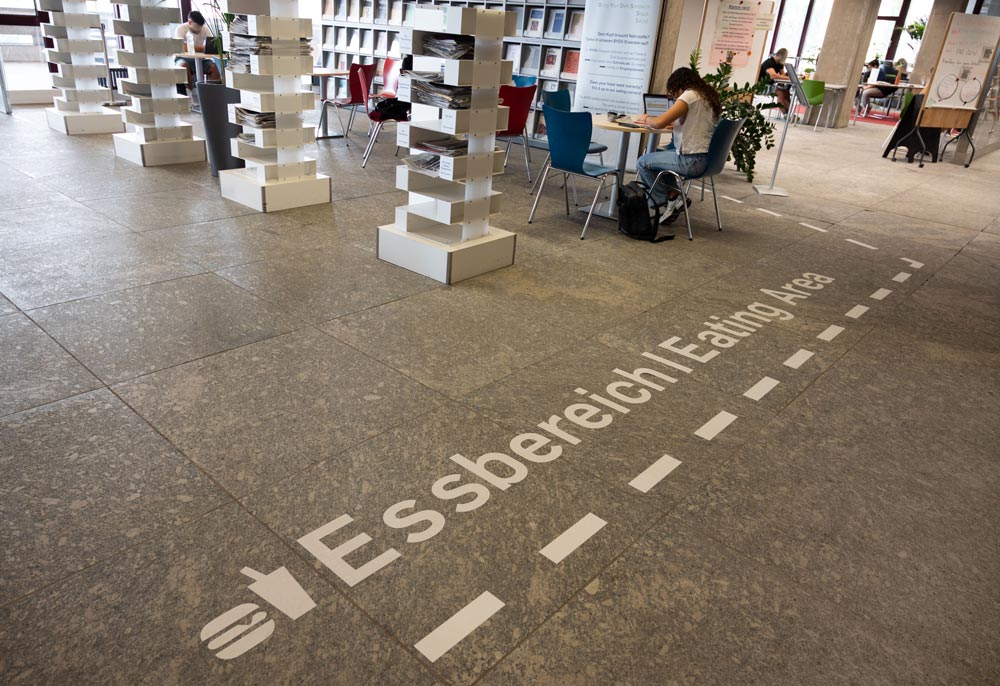
© RUB, Rosenkranz
Another highlight of 2024 was the installation of seven soundproof think tanks on Level 0 and in two reading room areas, which significantly improved working in small groups. The new room-in-room solutions, which can also be used for watching virtual lectures and for Zoom conferences, were fully booked around the clock from day one. The room concept is particularly sustainable and resource-efficient because the glass think tanks can be set up in different locations in the building as needed, i.e., they can be reused flexibly.
Together with the new think tanks, the university library now has 15 group work rooms with a total of 21 work areas for undisturbed and concentrated group work.
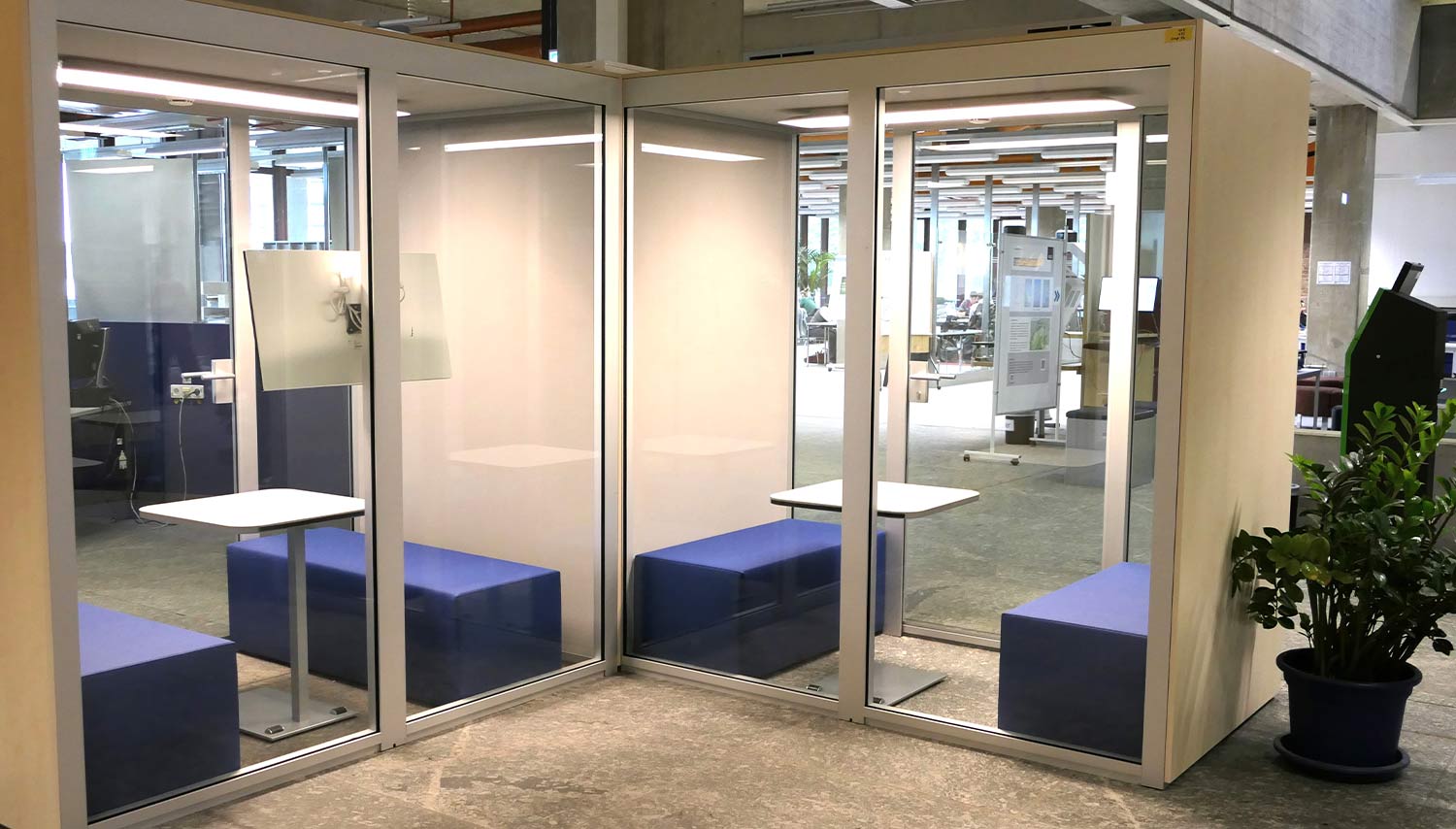
© RUB, Albrecht
Some of the older group study rooms were equipped with new video technology in 2024 with funds raised from the “Flächen der Zukunft” (Spaces of the Future) project for participation in digital learning and teaching formats and for Zoom conferences.
In addition, the hardware of the research workstations in the central stairwell was renewed while significantly reducing their number.
Two think tanks were also set up in the IC joint library, which were funded by the RUB project “Flächen der Zukunft” (Spaces of the Future).
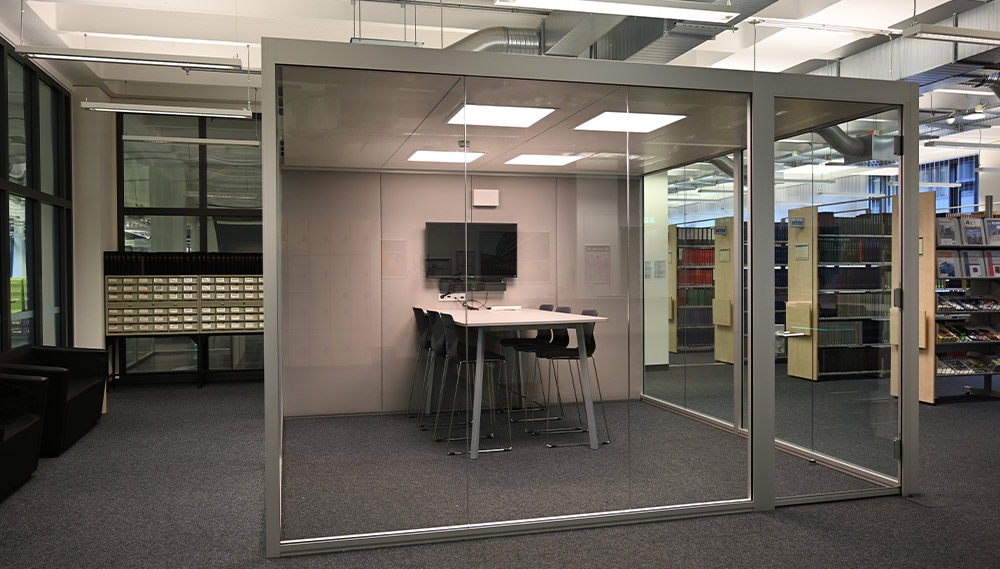
© RUB, Rosenkranz
The learning environment on Level 1 of the University Library building has been renovated and significantly upgraded. New flooring, new office chairs, and privacy screens, as well as a new layout for the lounge area with planters and wing chairs, create a new feel-good atmosphere for concentrated learning.
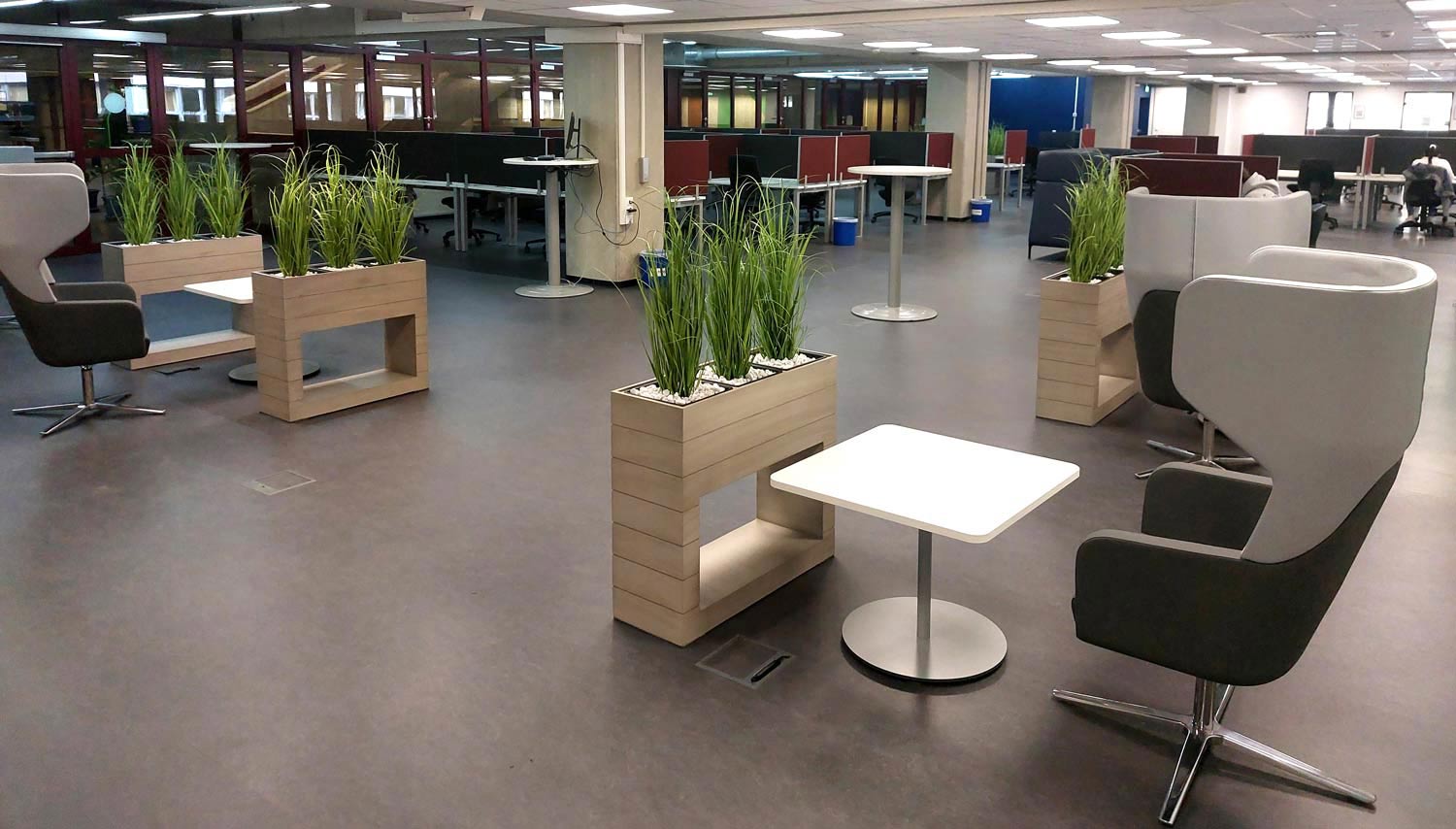
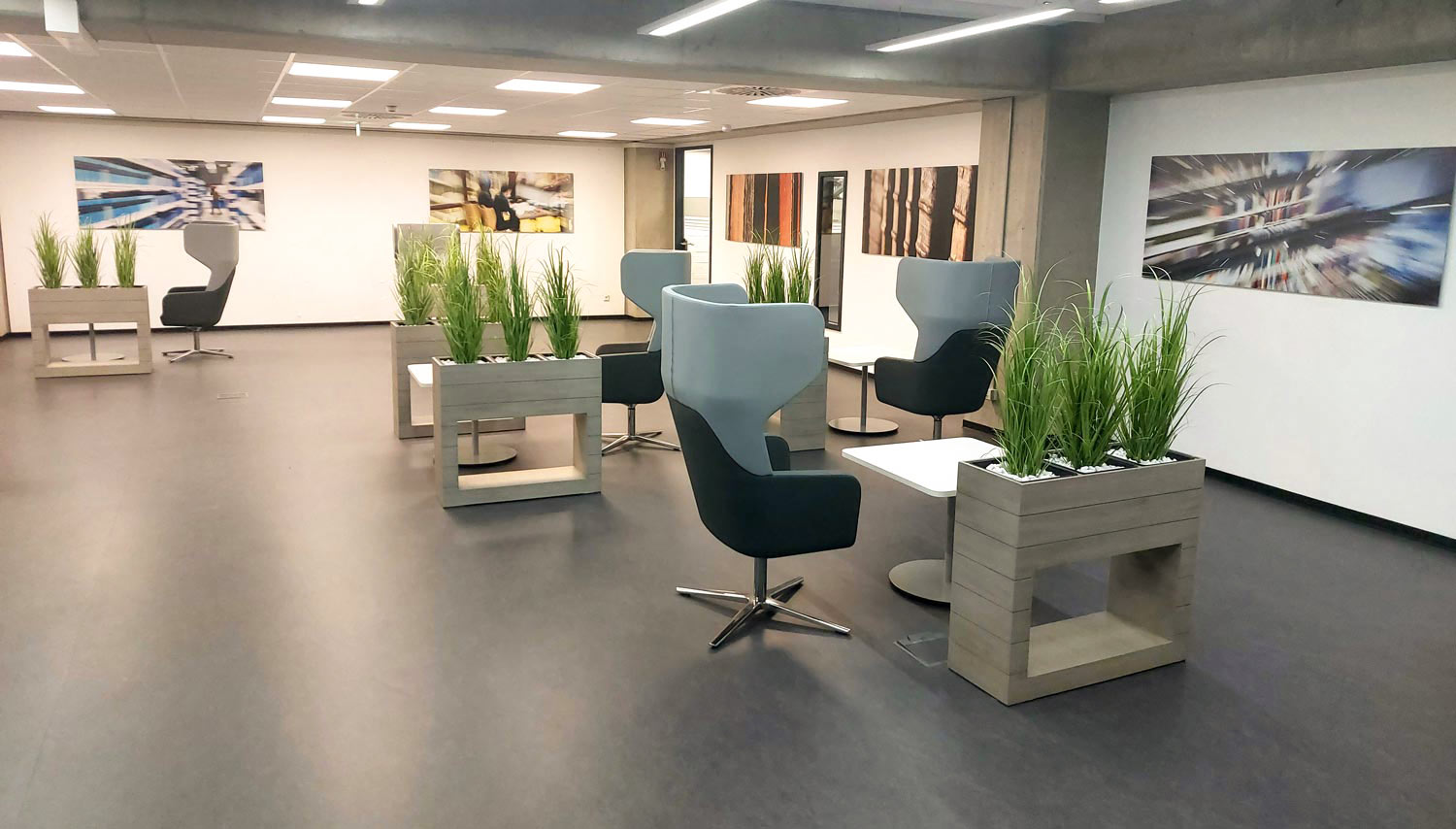
© RUB, Rosenkranz
The greening of the university library, which has been highly praised by our students, has been expanded with the addition of vertical gardens in the central stairwell. In about a year, the entire stairwell area between the 6th and 4th floors will have green curtains that improve the indoor climate.
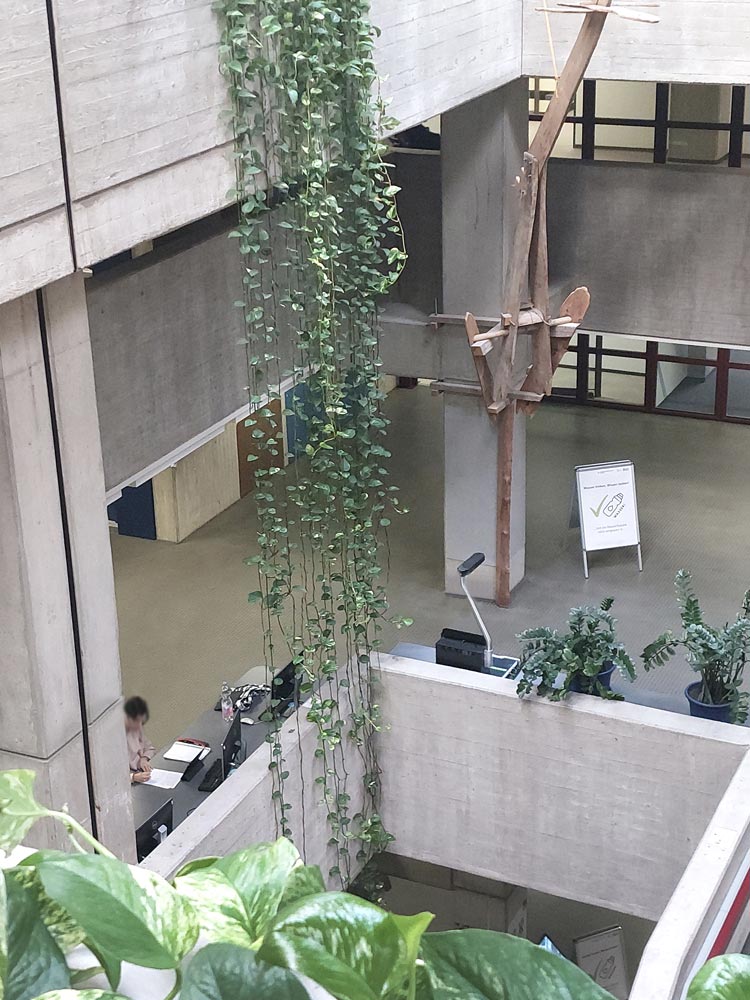
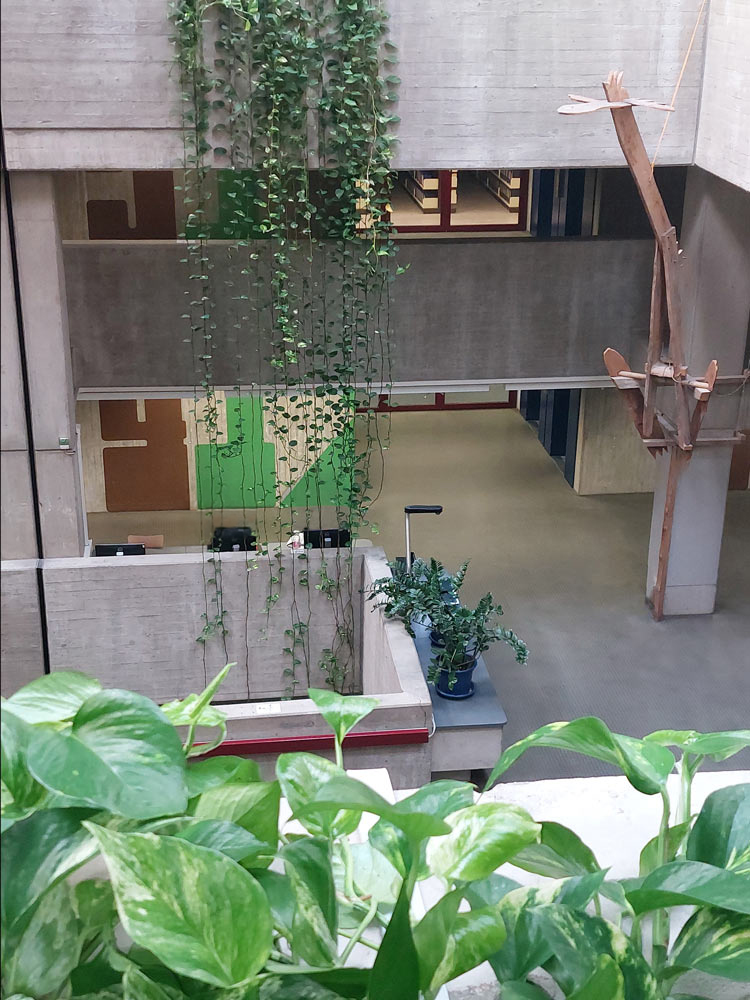
© RUB, Albrecht
4.2 Information provision as the cornerstone of research, teaching, and study
4.2.1 Media processing at the University Library
The introduction of the JobRouter workflow management system at the beginning of June 2024 enabled the University Library of Bochum to transition from paper-based to electronic invoice processing. By eliminating previously manual work steps, the invoice processing process was streamlined and the library's networking with other parts of the university was further expanded.
One of the central tasks of the University Library in 2024 was to provide students, teachers, and researchers at Ruhr University Bochum with a needs-based range of interdisciplinary and subject-specific digital media. By extending licenses for evidence-based selection models and purchasing selected e-book packages, the university library's e-book collection has grown to 666,316 e-books. The e-book packages from the scientific publisher Springer Nature, which are centrally funded by the state of North Rhine-Westphalia, have also contributed to this growth. As can be seen in the graph “E-book holdings of the University Library of Bochum 2017 to 2014,” the University Library has been able to offer its users a steadily growing e-book portfolio since 2018, which corresponds to the diversity of subjects at Ruhr University Bochum.
It is worth noting that the number of licensed databases in 2024 remained almost constant at a total of 238 compared to the previous year.
On the other hand, the number of printed books added to the university library's collection declined. With 4,385 copies, the trend observed in previous years continued, with print books increasingly being replaced by e-books.
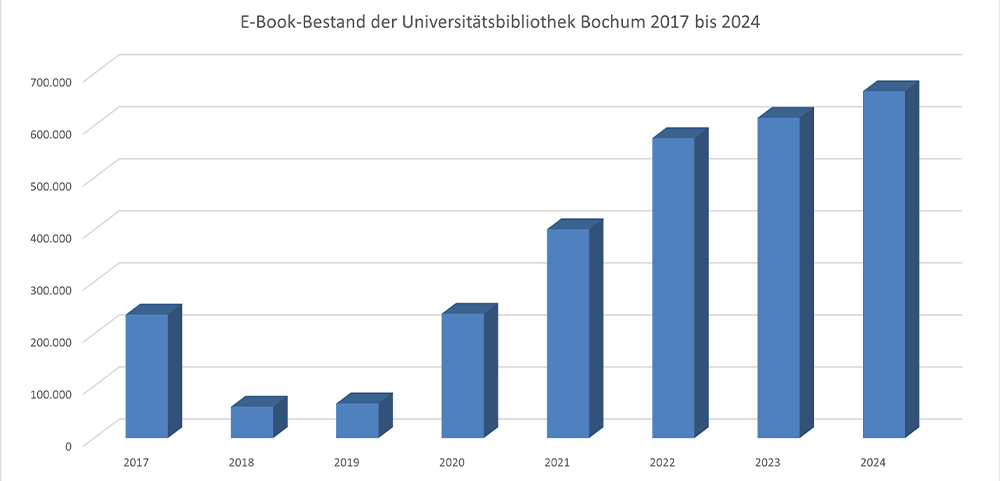
© RUB, Reuter
4.2.2 Teaching of information literacy
As in previous years, the Bochum University Library (UB) continued to play an important role in teaching and promoting information literacy on the campus of Ruhr University Bochum in 2024. The total number of courses held and the total number of participants declined slightly compared to 2023, as the University Library focused on its core target group of RUB members in the wake of job cuts and consolidation and was only able to offer very few online training courses on literature research for students' term papers, for example. Nevertheless, some types of courses, such as courses on subject-specific literature research and basic courses on using the University Library, saw an upward trend in participant numbers. In addition, there were significantly more courses offered in the areas of publication and research-related services.
Most of the training activities took place in person; with some formats offered both online via Zoom and in person. The digital range of self-learning materials and activities could not yet be expanded, as some Moodle courses and explanatory videos are currently being updated following the launch of the new library system and the publication of the new RUB libraries website in 2023. This has resulted in a downward trend in the number of participants in Moodle courses and views of the explanatory videos.
The total number of consultations remained slightly below the level of 2023, but more consultations were conducted in the areas of publication services, open access, and services for science and research than in the previous year.
The AI tool “Perplexity AI” was successfully used for the first time in consultation activities at the information/service desk. The search in the licensed EBSCO databases was successfully integrated into the literature search with the PRIMO discovery system.
Statistics – Overview 2024
- 313 courses (72 online courses, 241 classroom courses) with 4,075 participants (2023: 323 courses with 4,357 participants)
- 13 Moodle courses with 491 participants (2023: 13 courses with 941 participants)
- 104 consultations with 220 participants (2023: 117 consultations with 440 participants)
- 1,660 views of the explanatory videos (2023: 3,407 views)
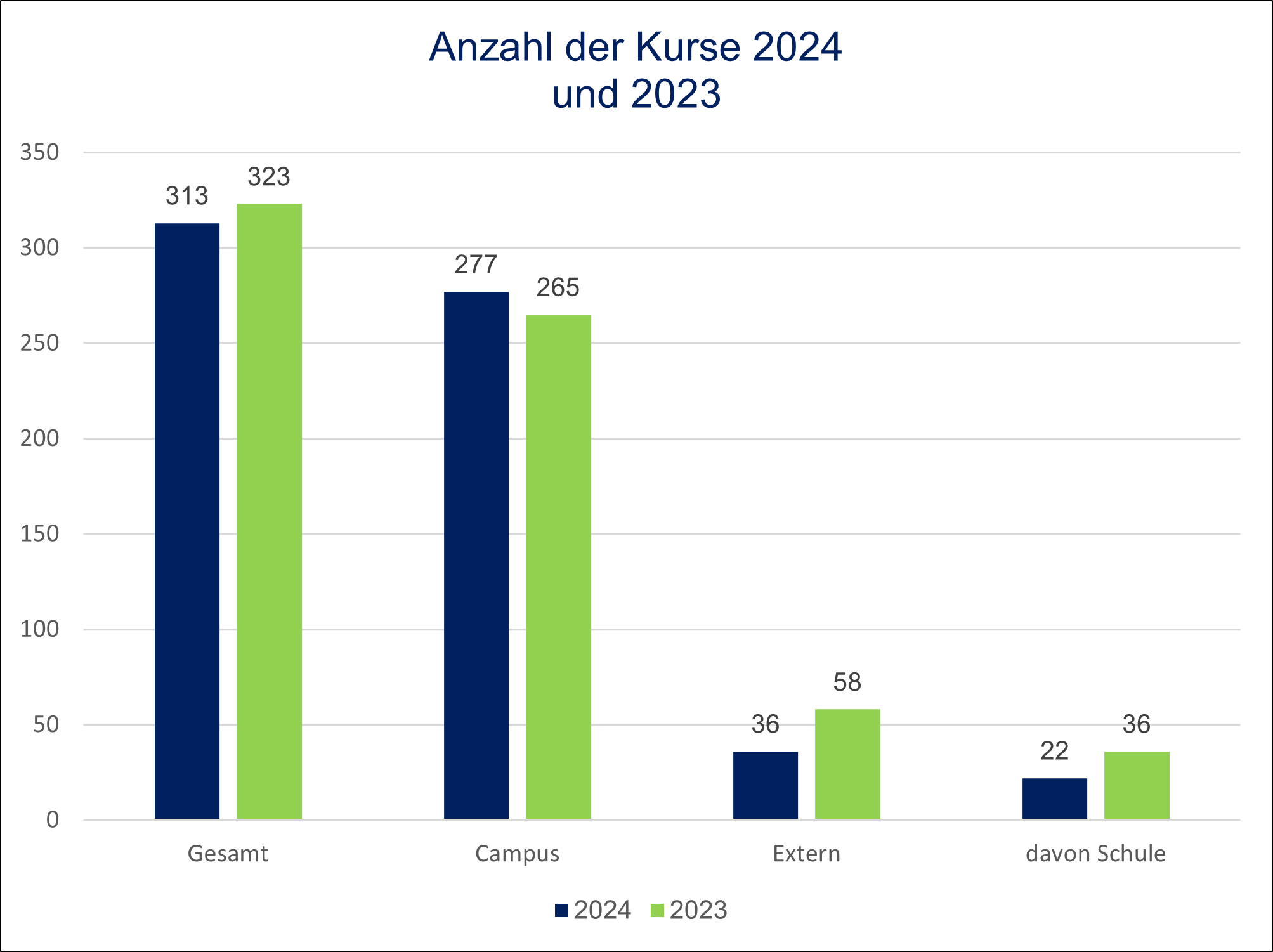
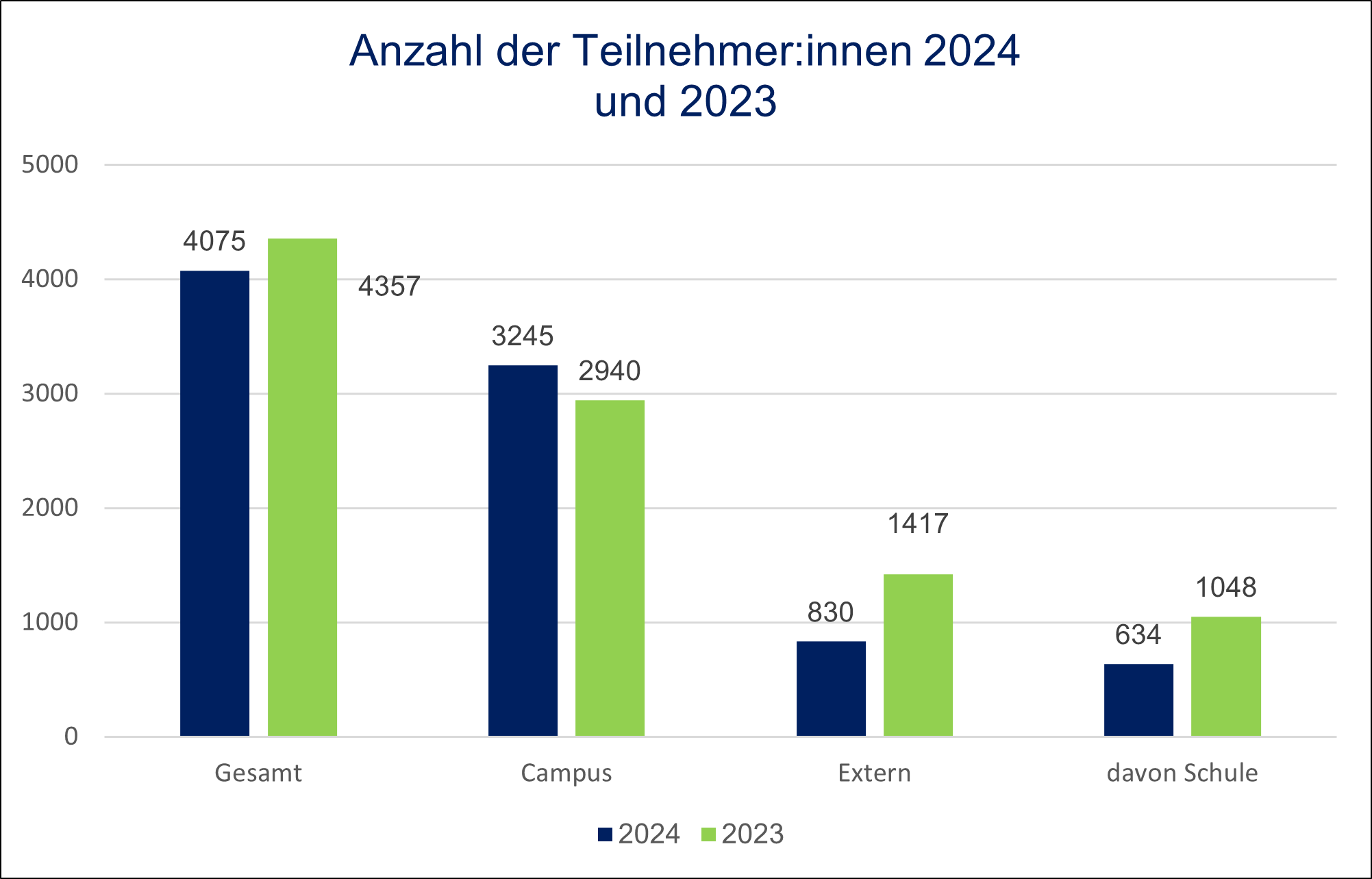
© RUB, Stekanov
5.1 Exhibition and event location UB: Transfer – Practical experience during studies – Open Science
We are delighted to have once again been a central location at RUB for the transfer of science into society, practical study, research-based learning, and exchange and discussion in a vibrant civil society, with seven exhibitions, eight lectures in colloquia, and a reading.
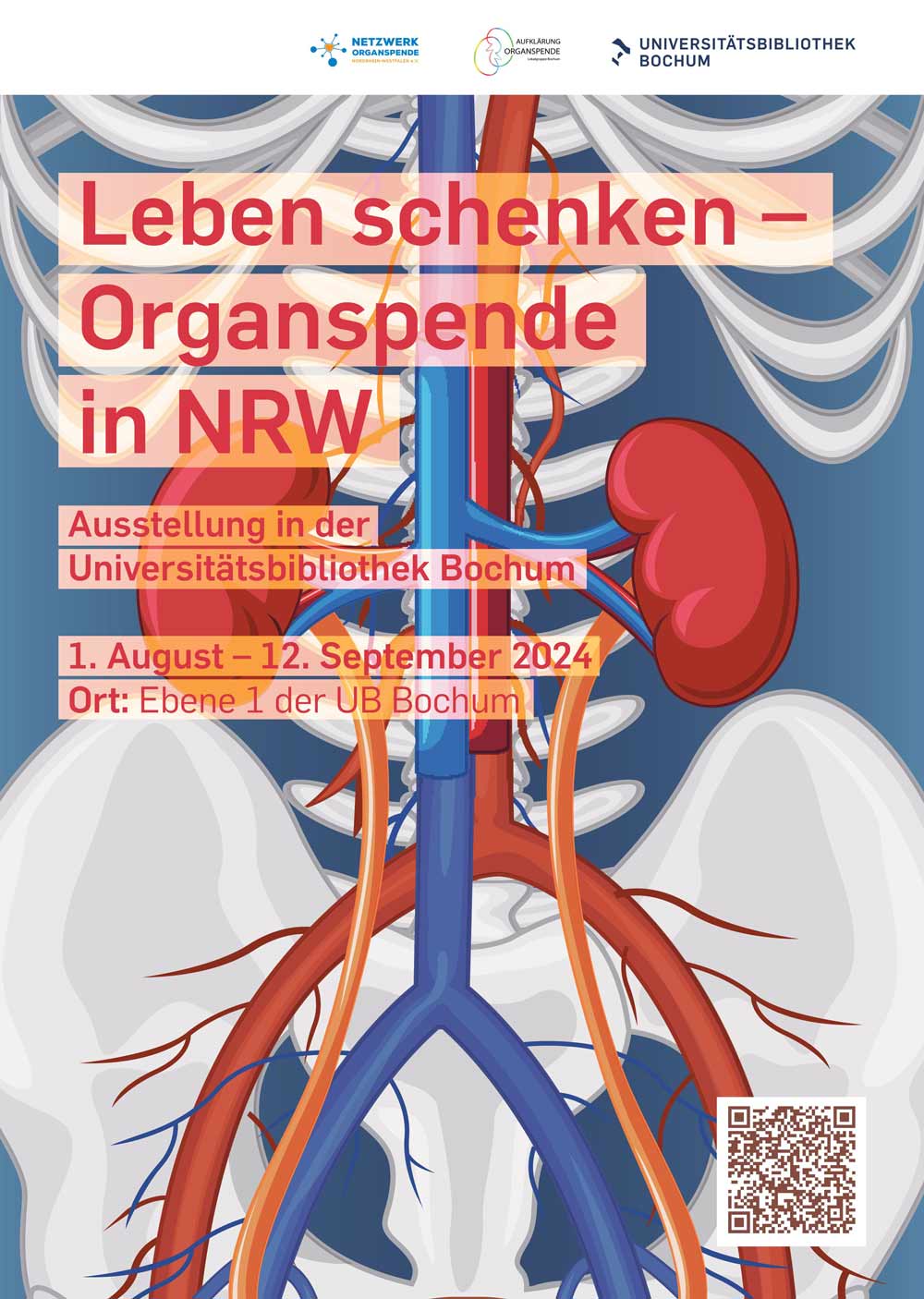
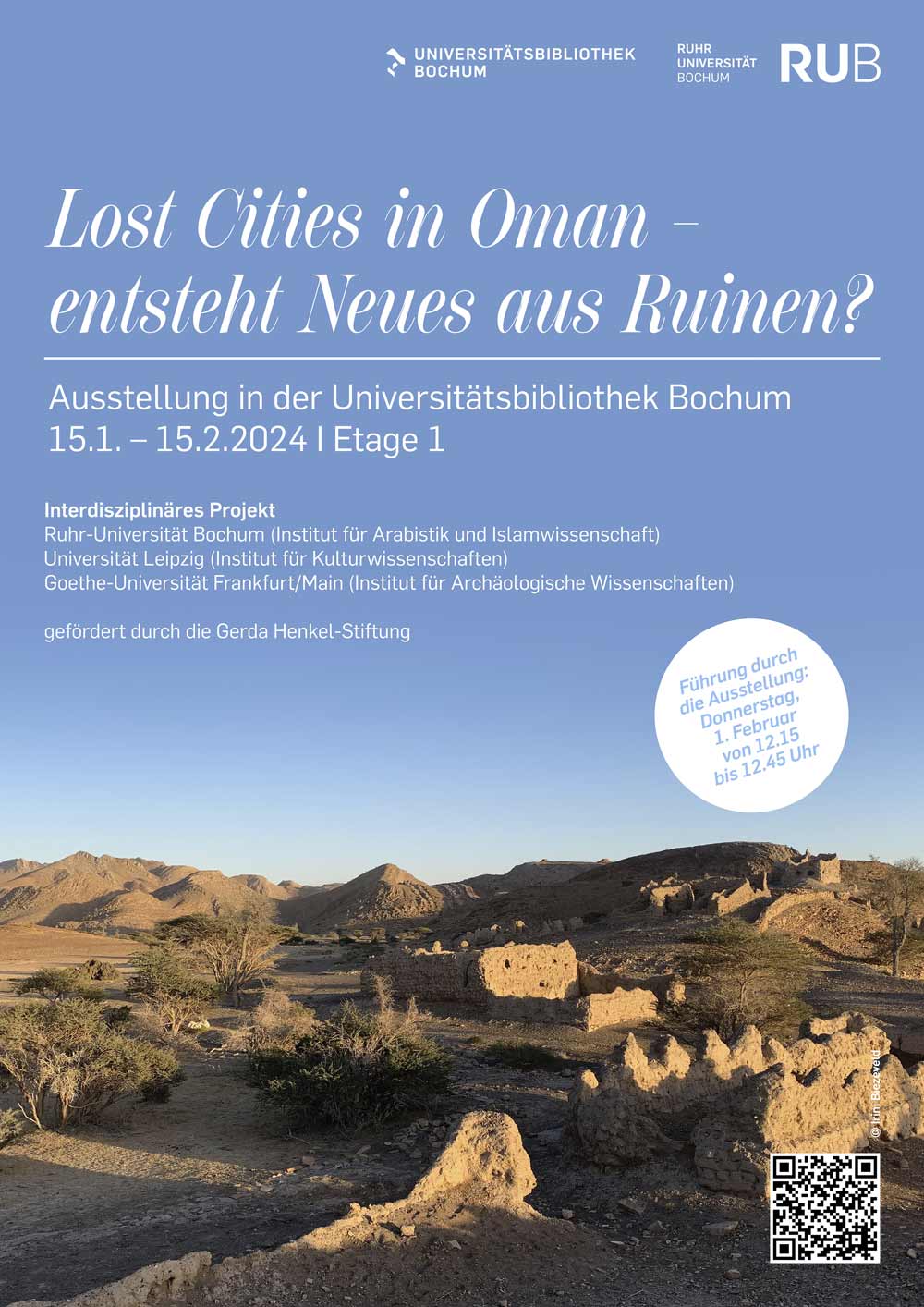
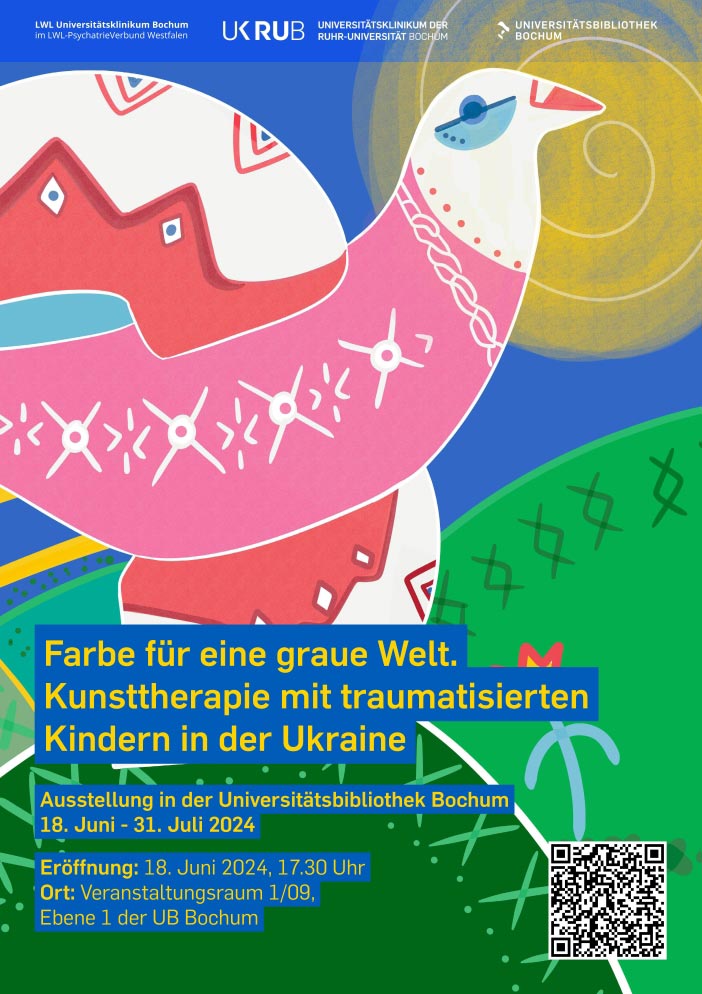
© RUB, Rosenkranz
The events in 2024 were diverse, and the feedback from participants and visitors was very positive. In cooperation with RUB institutes and (inter)national partners, initiated by scientists and/or students at RUB, the focus was on regions such as Oman, Taiwan, and Eastern Europe, but also on North Rhine-Westphalia, the Ruhr area, and students at primary schools in Bochum.
In addition to topics such as inclusion, medicine, psychology, neuroscience, and educational research, the University Library also presented interdisciplinary projects from the fields of Oriental studies, sociology, archaeology, philology, geosciences, and Slavic studies.
The catalog for the multimedia exhibition My Favorite Ukrainian Word is published in open access in the series Uni-Bibliothek-Bochum | Kontext Ausstellung.
In cooperation with
- Chiang Ching-kuo Foundation, Taiwan
- China Institute, Universität Trier
- German faculty, Taras-Schevtschenko university Kyjiw, Ukraine
- German Studies Department, RUB
- Institute for Archaeological Sciences, Goethe-Universität Frankfurt/Main
- Institute for Arabic and Islamic Studies, RUB
- Institute for German Studies, RUB
- Department of Sociology, University of Leipzig
- Inclusive university, RUB
- International Graduate School of Neuroscience (IGSN), RUB Klinik für Psychosomatische Medizin und Psychotherapie, LWL-Universitätsklinikum der RUB
- Department of Eastern European History, RUB
- Modern Taiwan studies, Eberhard Karls University Tübingen
- Netzwerk Organspende NRW e.V.
- Eastern Europe College NRW e.V.
- Taipei University of Education (National Taipei University of Education, NTUE), Taiwan
- Seminar for Slavic Studies/Lotman Institute, RUB
- Taiwan Research Center, Faculty of East Asian Studies, RUB
5.2 Public relations work at the University Library
5.2.1 Highlights of the year
On the one hand, there were collaborations that bore fruit at certain points in time and occasions that were particularly worthy of recognition.
In April, based on a synergy between the specialist department and public relations, a research magazine published a behind-the-scenes look at research-related and DH-affine work in libraries.
In May, the collaboration between the Accessible University Library team, the University Library's public relations department, and the RUB's inclusion projects made it possible to hold a workshop on the topic of “ableism” at the University Library in Bochum on the occasion of Diversity Day 2024.
In addition, the University Library and the RUB's Center for Science Didactics jointly published a blog post on research with AI.
In September, October, and November 2024, the University Library was once again the filming location for several of our partners.
- The RUB Academy filmed a promotional clip for its new sustainability-related degree program at our premises.
- WDR visited us to film the RUB perfume “Knowledge.”
- For the RUB's Instagram channel, footage was shot in our IB joint library for the RUB format “My Day as...”.
- A particularly memorable occasion was the 50th anniversary of the university library moving into its building on October 16, 2024, which we celebrated together with the university archive using old and new pictures.
5.2.2 Key topics of discussion
Conceptual work was once again a central component of our public relations activities in 2024. We continued our participation in the RUB-wide exchange on the topics of sustainability, inclusion, and alumni management.
A new social media concept was developed, as were plans to systematically increase the visibility of the University Library's research data management team.
To support this strategic issue at RUB, a campaign was also launched in November 2024 to promote our contribution to the nationwide Open Science November.
After extensive planning, we were also able to launch our WhatsApp channel in October 2024, thereby expanding the social media presence of the University Library of Bochum with another, particularly low-threshold offering.
Click here to access the University Library's WhatsApp channel:
5.2.3 The major project of the year: the new RUB library
One major project this year that brought together all departments of our institution and took shape thanks in particular to the tireless work of our web editorial team was the launch of the completely redesigned and revamped RUB library portal.
In March 2024, this website went live under the motto “structured, appealing, convenient.” In line with the new library management system and the new RUB Discovery, the library portal now has a contemporary look, is clearly structured, responsive, and has improved booking functions and increased accessibility. Available in German and English, it offers all important information about the central university library and the RUB's specialist libraries for students, researchers, teachers, and university staff, as well as for visitors from outside the university.
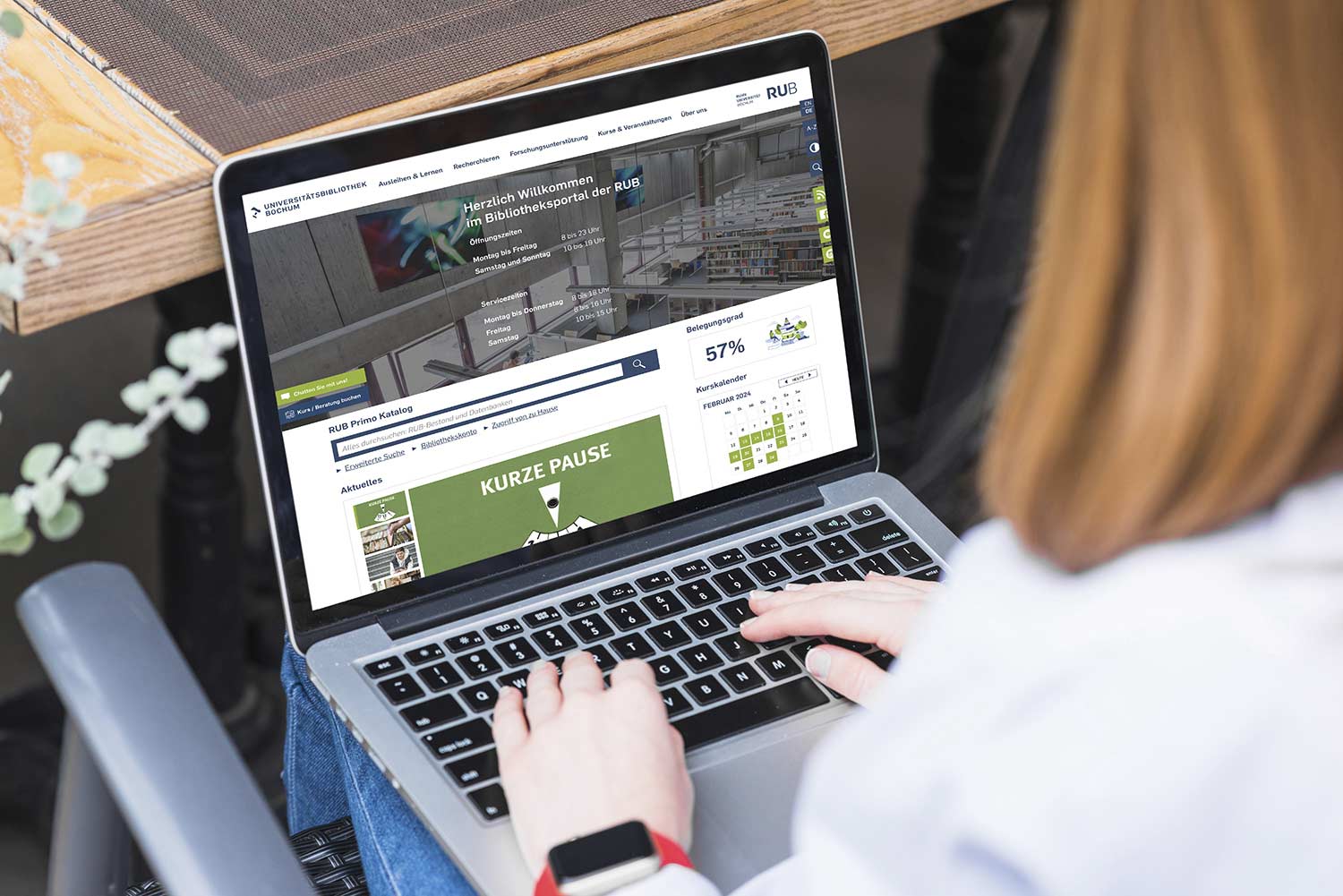
© RUB, Rosenkranz
5.3 Partnerships and collaborations
RUB intern
- AStA
- AG Open Science
- Academy of RUB
- Botanic Garden
- Center for Foreign Language Training
- Center for Science Education
- Chair of Eastern European History
- Clinic for Psychosomatic Medicine and Psychotherapy, LWL University Hospital of the RUB
- Departments and administrative offices
- Faculties and University Departments
- German Studies Department
- Institute for Arabic and Islamic Studies
- Institute for German Studies
- Inclusion projects at RUB
- Inclusive university at RUB
- International Graduate School of Neuroscience (IGSN)
- International Office
- IT.Services
- Methodology center
- Network Digital Humanities (NDH)
- Research Data Services
- RUB Research School
- Seminar for Slavic Studies/Lotman Institute
- Sustainability office RUB
- Taiwan Research Center, Faculty of East Asian Studies
- UKFW
- University Archive RUB
- World Factory – UB Library Space
- Young Uni
RUB-extern
- AGUB
- Bochum Library Network
- Bochum University of Applied Sciences
- Chiang Ching-kuo Foundation, Taiwan
- China Institut, University of Trier
- DBV
- DACHELA
- DFG
- DH NRW
- Eastern Europe College NRW
- Faculty of German Studies, Taras Shevchenko National University of Kyiv, Ukraine
- fdm.nrw
- Forum for Puppet Theater and Puppetry Arts e.V.
- Institute for Archaeological Sciences, Goethe University Frankfurt/Main
- Institute for Sociology, University of Leipzig
- IGeLU
- LZV.nrw
- Martin Opitz Library, Herne
- Modern Taiwan Studies, Eberhard Karls University of Tübingen
- National Taipei University of Education (NTUE), Taiwan
- NFDI
- Network media libraries
- Netzwerk Organspende NRW e.V.
- openacess.nrw
- ORCiD
- Specialized information services
- University Alliance Ruhr
6.1 An overview
Infrastructure
- Area of use: 12,461 sqm
- User workstations (UB + IB network library + IC network library + Hegel Archive): 1,411
Media inventory
- Printed books – inventory: 1,755,462
- Electronic publications: 667,696
- Current printed journals: 193
- Licensed electronic journals (campus): 68,370
Media budget
- Expenditure on media advertising: € 3,779,603
Using
- Active users: 17,830
- Of which non-university users: 5,318
- Loans (including renewals): 214,357
Courses
- 313 (72 online courses, 241 classroom courses) with 4,075 participants
- 104 consultations with 220 participants
- 13 Moodle courses with 491 participants
Education and internships
Ruhr University Bochum offers training programs for media and information services specialists (FaMI) in the field of library science, among other things.
The university library also offers numerous internships.
- Trainees for media and information services (FaMI): 2
- Students doing practical training: 2
Departmental libraries at ruhr-university Bochum
- Number of libraries: 28
- Holdings (printed volumes): 2,586,849
German Library Statistics
Further information and comparisons with other libraries can be found in the German Library Statistics (DBS).
